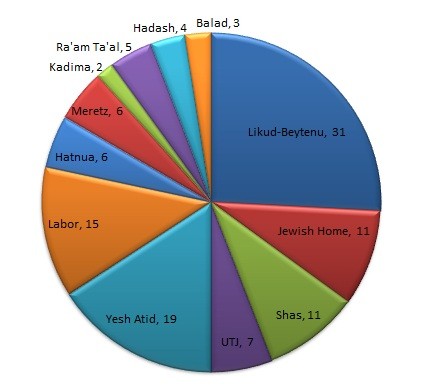 Only a day after a minor American political event – namely, the inauguration of the President of the United States – Israelis yesteday went to the polls to elect their new government. Why do we care, you ask? Well, this is the government likely to lead the State of Israel for the next 3-5 years or so – and likely set the course on issues as wide-ranging as negotiations with the Palestinians, dealing with nuclear Iran, the role of religion in Israeli society, and relations with Diaspora Jewry.
Only a day after a minor American political event – namely, the inauguration of the President of the United States – Israelis yesteday went to the polls to elect their new government. Why do we care, you ask? Well, this is the government likely to lead the State of Israel for the next 3-5 years or so – and likely set the course on issues as wide-ranging as negotiations with the Palestinians, dealing with nuclear Iran, the role of religion in Israeli society, and relations with Diaspora Jewry.
Alright, you’ve got our attention. So what happened?
Below are the results of the voting (as of 6:00 am Israel time, with 99% of the vote counted), broken out by political party.
Bear in mind that Israel is a Parliamentary Democracy, on the model of England, Italy, and Germany. I’ve written about this structure before, but the salient feature to bear in mind is that Israelis cast a vote for 1 of a large number of political parties all across the political spectrum. All parties that gain more than approximately 2% of the vote gain a proportionate number of seats in the 120-seat Knesset – the Israeli Parliament. In order to govern, a subset of parties in the Knesset must compromise (read: wheel and deal) to form a coalition of more than 60 MKs (Members of Knesset), and that coalition becomes the new government of Israel. It may sound crazy to us, but remember – Israelis have never even heard of the “Electoral College”… (Key note to remember: the government remains in power only so long as 60 MKs remain in the coalition. As soon as a few decide to quit – the government may fall, and new elections are called. Click here for more information.)
So without further ado – the electoral results:
- Likud-Beytenu (led by Benjamin Netanyahu) – 31 seats
- Yesh Atid (led by Yair Lapid) – 19 seats
- Labor (led by Shelly Yahimovich) – 15 seats
- Shas (led by Eli Yishai) – 11 seats
- Jewish Home (led by Naftali Bennett) – 11 seats
- United Torah Judaism (led by Yaakov Litzman) – 7 seats
- Hatnua (led by Tzipi Livni) – 6 seats
- Meretz (led by Zehava Gal-On) – 6 seats
- Ra’am Ta’al (led by Ibrahim Sarsur) – 5 seats
- Hadash (led by Mohammad Barakeh) – 4 seats
- Balad (led by Jamal Zahalka) – 3 seats
- Kadima (led by Shaul Mofaz) – 2 seats
And for those who prefer a more visual breakdown:
Ladies and Gentlemen, I give you the 19th Knesset of the State of Israel
Here is the key thing to note about this picture – this Knesset breakdown creates a rather unique opportunity for the next coalition builders.
Since the MK who is tasked with forming the coalition – and who then becomes Prime Minister – is usually the head of the largest party (in this case, Likud-Beytenu), it is most likely that Benjamin Netanyahu will continue on as Prime Minister of Israel – but with brand new coalition partners and a new set of ministers. And this is where things get interesting.
Often, the results of an election essentially go on to pre-determine the coalition makeup, as well. Some parties just naturally fit together better than others, and form natural coalitions (think the Sierra Club and the NAACP or the NRA and the Christian Coalition). But this case is different, and opens up a real opportunity.
Presuming that Netanyahu remains Prime Minister, and his Likud-Beytenu party is leading the coalition (and remember – he has to get to at least 60 MKs), he has 2 options to work with.
He can form a Hawkish/Religious coalition (similar to today’s Knesset), which would look like this:
Likud-Beytenu (31) + Jewish Home (11) + Shas (11) + UTJ (7) = 60 MKs
OR
He has an oppotunity to move the country in a very interesting new direction.
Most coalitions in Israel have always relied on religious (Orthodox) parties to secure the coalition.
In this case, with the rise of a large number of centrist and center/left parties, Netanyahu can also attempt to build an alternative, Hawkish/Centrist, secular coalition, like this:
Likud-Beytenu (31) + Jewish Home (11) + Yesh Atid (19) = 61 MKs
Or possibly even, if Netanyahu can get Shaul Mofaz (Kadima) and Tzipi Livni (Hatnua) to cooperate:
Likud-Beytenu (31) + Jewish Home (11) + Yesh Atid (19) + Hatnua (6) + Kadima (2) = 69 MKs
Such a coalition may create very interesting opportunities for change in the priorities of the government.
On the foreign front, a mixed, Right-and-Center government, in which Netanyahu himself is a relatively middle-of-the-road player, is also likely to play better in the eyes of foreign governments (and certainly the groomed and well-spoken Lapid and Livni play far better in the West than many other politicians), and potentially allow Netanyahu more room to maneuver on negotiations with the Palestinians, given a wider range within his coalition not locking him down to one single path.
All this is of course highly dependant on what happens over the next few days. What Netanyahu does, who he speaks to, and what deals he is able to make. We won’t really know the face of the new government for a few days, if not weeks. But for now, this setup certainly leaves me quite hopeful – if nothing else, there are options, and in the Middle East, that’s already saying a lot.
For more information on the Israeli electoral system, and the role that coalitions play in it, please click here.
Since Yesh Atid is new on the Israeli political scene, click here for a detailed interview with its founder, journalist Yair Lapid.
[Image copyright: Jenna Mitelman]



